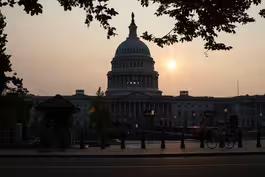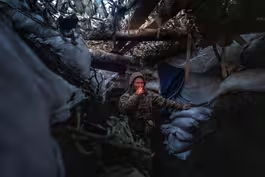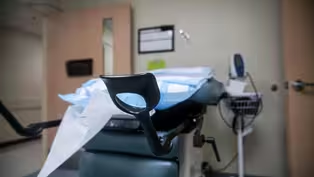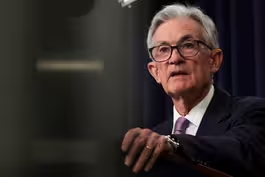
Deep-sea mining raises concerns over impact on environment
Clip: 9/18/2024 | 10m 26sVideo has Closed Captions
Papua New Guinea locals concerned over deep-sea mining's impact on culture and environment
The companies that create technology used on a daily basis often run into traditional cultures and the environment that sustains them. In a previous report, videographer Edward Kiernan and special correspondent Willem Marx introduced us to the new and potentially lucrative industry of deep-sea mining. They return to Papua New Guinea and report on locals fighting to save a vanishing way of life.
Problems playing video? | Closed Captioning Feedback
Problems playing video? | Closed Captioning Feedback
Major corporate funding for the PBS News Hour is provided by BDO, BNSF, Consumer Cellular, American Cruise Lines, and Raymond James. Funding for the PBS NewsHour Weekend is provided by...

Deep-sea mining raises concerns over impact on environment
Clip: 9/18/2024 | 10m 26sVideo has Closed Captions
The companies that create technology used on a daily basis often run into traditional cultures and the environment that sustains them. In a previous report, videographer Edward Kiernan and special correspondent Willem Marx introduced us to the new and potentially lucrative industry of deep-sea mining. They return to Papua New Guinea and report on locals fighting to save a vanishing way of life.
Problems playing video? | Closed Captioning Feedback
How to Watch PBS News Hour
PBS News Hour is available to stream on pbs.org and the free PBS App, available on iPhone, Apple TV, Android TV, Android smartphones, Amazon Fire TV, Amazon Fire Tablet, Roku, Samsung Smart TV, and Vizio.
Providing Support for PBS.org
Learn Moreabout PBS online sponsorshipAMNA NAWAZ: In our globally connected lives, the companies that make the technology we rely on every day can run headlong into traditional cultures and the environment that sustains them.
Last night we featured a new potentially lucrative industry, deep-sea mining.
Tonight, videographer Edward Kiernan and special correspondent Willem Marx return to Papua New Guinea and the Bismarck Sea, where locals are fighting back to preserve a vanishing way of life.
WILLEM MARX: Rodney Kadog has been prepping bait like this since he was a teenager, when he first ventured out alone in a canoe.
Fishing far out at sea or on reefs closer to shore has sustained Papua New Guinea's coastal communities for centuries.
Like many local kids, Rodney started catching fish around age 6.
He later moved to this village called Kono to get married.
Its shoreline on an island named New Ireland has been his home ever since and fishing remains his primary job.
RODNEY KADOG, Fisherman (through translator): It can help us with our families.
It generates financial income, which supports us, as well as sustains our livelihood in our village.
Fish is good.
WILLEM MARX: Fishing helps feed his kids and if he ever trades or sells his catch, it helps fund their other needs too.
But the bites don't come as often as they once did, perhaps due to a growing population or the changing climate.
He's not sure.
RODNEY KADOG (through translator): When I was younger, it was a lot faster.
As soon as we cast our lines, we would bring in a lot of fish, compared to now, when fish are scarce.
Today, it takes a long time for us to catch one fish.
WILLEM MARX: Rodney often paddles out rapidly past the island's reef break, sometimes sitting for hours several miles offshore.
But beyond the reach of a typical canoe ride farther out on this sea called the Bismarck sits a vast ship called MV Coco that villagers like Rodney worry could disturb the waters where local fish breed and damage their future fishing stocks.
Floating in place a mile above the seafloor, this vast vessel is testing a new technique for an often controversial industry called deep-sea mining.
A giant device called the grabber scoops up several tons of rock from the seabed and sends it up to the ship's deck for analysis.
Close to the mining site, the ship's crew show us these so-called chimneys of rock, crawling with mollusks and crabs with warmer water flowing from a vent that's visible on the ocean floor.
But as the grabber leaves the water one evening, there's a major hitch.
It hasn't fully closed.
That means a large amount of material from the ocean floor has leached into the water column on its way up to the ship.
Marine experts around the world insist any form of deep-sea mining will damage ocean life.
But environmental scientists have been hired and brought on board to better understand whether this sort of damage can be minimized or possibly mitigated.
As part of their monitoring, they lower tubes into the ocean to capture samples at different depths, then collate the resulting data to examine the impact on the waters around the site.
A geologist from Papua New Guinea, meanwhile, photographs this haul, then gets to work assessing the concentration in these rocks of metals like copper, so crucial to the global energy transition.
The team on board are trying to confirm whether these metals can be mined efficiently, profitably and safely under the supervision of James Holt, an offshore manager for one of the companies involved in this effort.
He says deep-sea mining could cause less harm than its onshore equivalent.
JAMES HOLT, Offshore Manager, Magellan: I mean, I personally believe that, environmentally, this is a lot better.
We're not relocating villages.
We're not laying waste to huge areas of land.
Because of the quality of the material here, we have to mine 300 percent less ground to get the same amount of copper that you would get on land.
WILLEM MARX: But given the uncertain consequences of this deep-sea extraction, it's an argument Jonathan Mesulam finds difficult to accept.
JONATHAN MESULAM, Alliance of Solwara Warriors: Currently, there's no precedent case of sea mining around the world.
Even scientists that I have talked to, the politicians, you and I, we don't really understand what is the likely impact is going to happen.
So we don't want to take risks.
WILLEM MARX: Mesulam left his job as a teacher to help set up a group focused on blocking seabed mining.
He travels along the island's sometimes rugged local roads to provide communities here with information he says they need to make decisions to weigh the possible benefits of a new project against its potential drawbacks.
Most New Irelanders live in scattered coastal villages like Kono, around 700 residents with homes hunched on the shoreline at the foot of huge mountains.
Alongside fishing, pig and crop farming, as well as other traditional activities, dominate daily life in the village.
For as long as the oldest residents can remember, they have gathered beneath these ancient trees to debate and discuss the community's challenges.
On a recent visit, 63-year-old village chief Chris Malagan opened the meeting.
He was appointed to this role decades ago and appears to relish the responsibility.
He eventually invited Mesulam up to address the weekly council.
Patently, painstakingly, the campaigner explained what little he knew about the presence of a deep-sea mining vessel just over the horizon.
Then locals took their turn to speak on the subject, sometimes concerned, occasionally upset.
For many residents, including Malagan, this poorly understood new industry seems to represent an existential threat at a time when fish stocks are already struggling.
CHRIS MALAGAN, Chief, Kono Village (through translator): The ocean is our life.
For us, the coastal people, it is our garden.
We catch fish and share with others in the village without being paid.
When we catch fish and sharks, we share with other families who need it to spread love and kindness.
WILLEM MARX: Finding enough food can already be a challenge in communities like this, and after years without any significant support from the state, Malagan fails to believe an offshore mining project involving foreign companies might help.
Do you think that the government of Papua New Guinea, the governor, the local representatives here on New Ireland, do you think they are on your side or on the side of the companies doing the prospecting?
CHRIS MALAGAN (through translator): Well, they are on the side of the company and not working in our favor.
As a result, we the people are suffering.
WILLEM MARX: How does that make you feel?
CHRIS MALAGAN (through translator): We are now faced with a huge problem.
WILLEM MARX: Are you angry?
CHRIS MALAGAN (through translator): Yes.
We will miss out on the benefits.
The government and the national government will benefit from this.
And we, the local, people, will have nothing, except schools and health clinics.
But as for the people within the villages, there won't be other services.
This is a big problem.
WILLEM MARX: Meetings like this mean a great deal to Jonathan Mesulam.
Until recently, he thought his decade of opposition had helped permanently stop seabed mining close to new Ireland.
JONATHAN MESULAM: People are surprised, they're shocked after learning that the new company is coming back.
Because all our efforts on campaigning against seabed mining, we thought it was a dead issue now.
But now we are back.
We are awakened.
We are now campaigning against this new company.
WILLEM MARX: And amid conversations with villagers like Rodney and Chris, Mesulam says he feels betrayed by his own government, and the personal costs have been high.
JONATHAN MESULAM: It's really stressful.
You have a family to feed.
You are taking a risky path.
It's really emotional, because you are trying to commit yourself to a good cause.
And it's -- to me, it's really emotional when discussing this issue.
WILLEM MARX: He hopes to move forward on a legal case against the government to force more information about deep-sea mining into the public domain.
JONATHAN MESULAM: We don't want to be used as guinea pigs for trial and error, because these metals that are going to be dug out of our ocean will not benefit anyone from here, because nobody here is using electric cars.
So, you are taking minerals from the poor people, and you go and enjoy your luxury life.
But these people are going to be affected in a long-term destruction to the marine ecosystem.
And that is something that we are very concerned about.
WILLEM MARX: For locals like Rodney, global copper markets may operate far from their fishing waters, but community cohesion is something he wants to support.
It could, he hopes, help combat this perceived threat to his livelihood.
RODNEY KADOG (through translator): If we have a lot of conversations, raise a lot of awareness and have cooperation among our leaders in the communities to put up a fight against this, then the seabed mining will not happen.
WILLEM MARX: Not for the first time nor the last in our globalized world, a new industry with cutting-edge technology is colliding with traditional techniques and an ancient way of life.
For the "PBS News Hour," I'm Willem Marx in Kono, New Ireland, Papua New Guinea.
AMNA NAWAZ: Tomorrow, we will delve into the seeming lack of government oversight of deep-sea mining and the forces behind that avoidance.
Campaigns face calls for civility in contentious election
Video has Closed Captions
Clip: 9/18/2024 | 3m 33s | Campaigns face increasing calls for civility in contentious election season (3m 33s)
Congress scrambles to avert government shutdown
Video has Closed Captions
Clip: 9/18/2024 | 4m 42s | With election looming, Congress scrambles to avert government shutdown (4m 42s)
Lebanon rocked by 2nd wave of exploding devices
Video has Closed Captions
Clip: 9/18/2024 | 7m 37s | Lebanon rocked by 2nd wave of exploding device attacks targeting Hezbollah (7m 37s)
Lindsey Hilsum shares poetry inspired by the front lines
Video has Closed Captions
Clip: 9/18/2024 | 6m 7s | In 'I Brought the War with Me,' Lindsey Hilsum shares poetry inspired by the front lines (6m 7s)
Report links Georgia's abortion ban to preventable deaths
Video has Closed Captions
Clip: 9/18/2024 | 7m 3s | Investigation links Georgia's abortion ban to preventable deaths of 2 women (7m 3s)
What the Fed's interest rate cut means for inflation
Video has Closed Captions
Clip: 9/18/2024 | 5m 52s | What the first interest rate cut in 4 years means for the Fed's fight against inflation (5m 52s)
Providing Support for PBS.org
Learn Moreabout PBS online sponsorship
- News and Public Affairs

FRONTLINE is investigative journalism that questions, explains and changes our world.

- News and Public Affairs

Amanpour and Company features conversations with leaders and decision makers.












Support for PBS provided by:
Major corporate funding for the PBS News Hour is provided by BDO, BNSF, Consumer Cellular, American Cruise Lines, and Raymond James. Funding for the PBS NewsHour Weekend is provided by...





